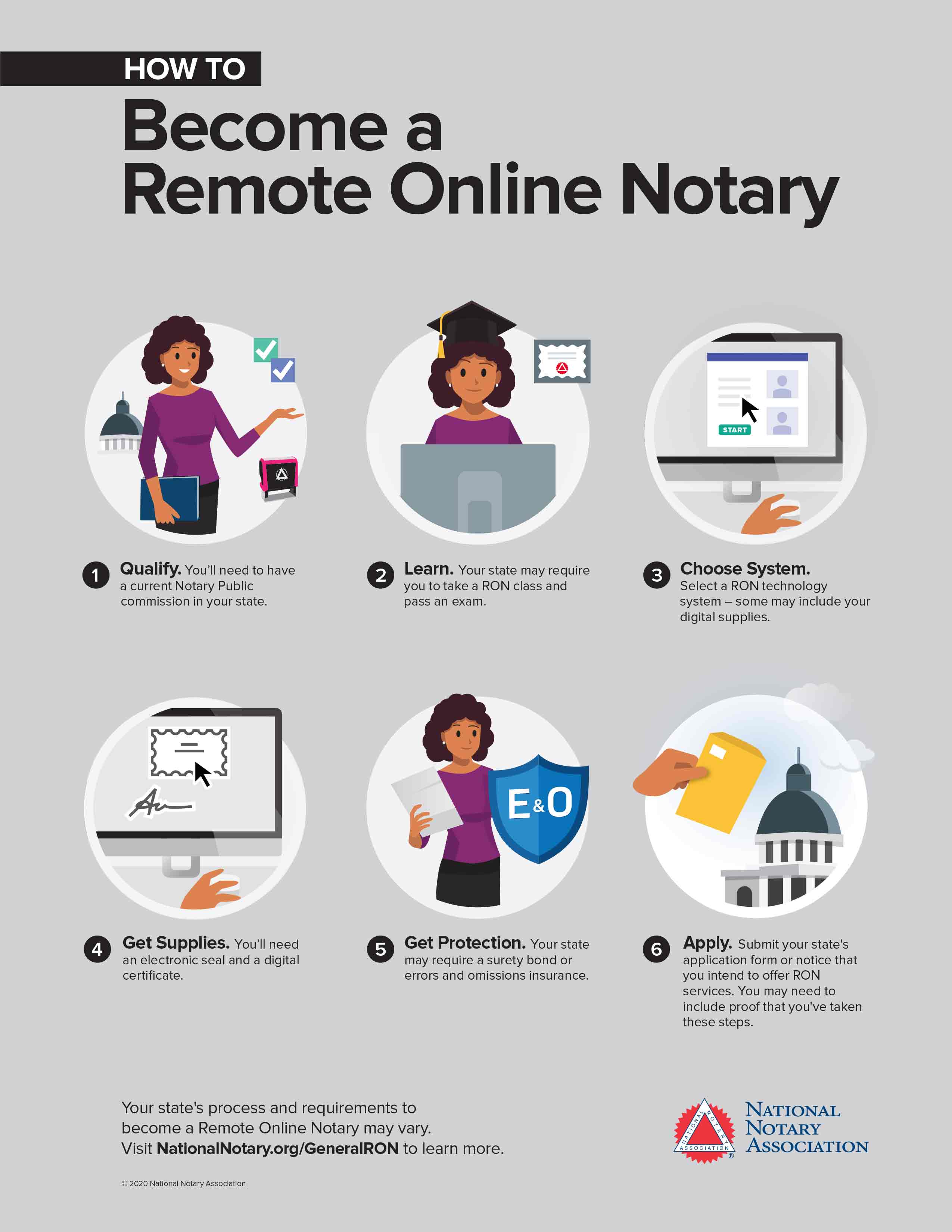Your state's Notary regulating official will have a specific authorization process for you to provide remote online notarization (RON). Below are the general steps to become a remote online Notary.

- Meet your state's qualifications to become a traditional Notary.
- Apply or register to perform virtual notarizations.
- Pay the state's application fees.
- Complete a RON-specific training course (if applicable).
- Pass an exam (if applicable).
- Get your electronic Notary seal and digital certificate.
- Choose a state-approved RON vendor.
- Get an additional surety bond (if applicable).
- Get an E&O insurance policy that covers RONs.
- Submit any other required documents.
State RON Instructions
View step-by-step instructions to apply for RON authorization in your state
In This Guide: About RON Authorization | Eligibility Requirements | RON FAQs
About RON Authorization
RON authorization cost
The cost to become a remote online Notary ranges from below $100 to a few hundred dollars, depending on your state's requirements. In general, your expenses will include:
Authorization processing time
It can take up to six weeks to become an online Notary. Up to four of those weeks will be spent on the first step, which is becoming a traditional Notary. The rest of the process can be completed fairly quickly.
After you receive your commission as a traditional Notary Public, you will spend a few hours taking a RON training course (if required), one to two days getting a quote for both the surety bond and E&O policy, and one day to get your application form notarized, if required.
Then, you'll need to submit the application and any other requested materials, plus the application filing fee, to your state's Notary regulating official. From there, the state will process your application.
Remote Online Notary Eligibility Requirements
In some states, you must hold a commission as a traditional Notary Public before you apply to become a remote online Notary.
In other states, you may be able to apply for a Notary commission and authorization to perform remote online notarizations at the same time.
Because you must be a commissioned Notary to offer remote online notarization services, you must meet your state's qualifications for becoming a traditional Notary. Some states have more requirements than others, but most of them include:
- Being at least 18 years old
- Being a legal resident of the state
- Having no felony convictions
Be sure to check your state's RON laws to confirm you meet all requirements for working as a remote Notary.
Exam
Some states require remote online Notaries to pass an exam proving their knowledge of RON procedures and use of the technology. Indiana, Montana, Nevada and Ohio require Notaries to pass an exam.
Remote Online Notary Training
Each state differs on whether they require applicants to complete special RON training.
Notary Bond & Insurance
An additional surety bond to cover remote online notarizations may be required in your state. E&O insurance is required in Florida and optional in all other states.
Remote Notary Tools
Remote online Notaries are required to have access to a computer with a webcam, microphone and secure connection to the internet. Your computer must be able to support two-way audio-visual communication to function with a RON technology platform compliant with your state's laws.
Several remote notarization technology providers offer end-to-end remote online notarization solutions. Check your state's website for a list of approved vendors.
Depending on your commissioning state, you may also need an electronic Notary seal, a digital certificate and an electronic journal to provide RON services.

Remote Online Notary FAQs
How much can remote online Notaries charge for their services?
Typically, in most states, you can charge up to $25 per remote online notarization. Check your state’s statutes or administrative rules for the maximum fee you may charge.
Who can you perform remote online notarizations for?
Under most state laws, remote online Notaries may notarize documents for signers located anywhere in or outside of the U.S. Regardless of where the signer is located, the Notary must be physically located in their commissioning state during the notarial act.
If the signer is outside of the U.S., most states require the electronic document being notarized to substantially pertain to matters located within the U.S.
Also, the country where the remote signer is located must not prohibit remote online notarizations, or the remote online Notary must not have actual knowledge of the notarial act being prohibited where the signer is located.